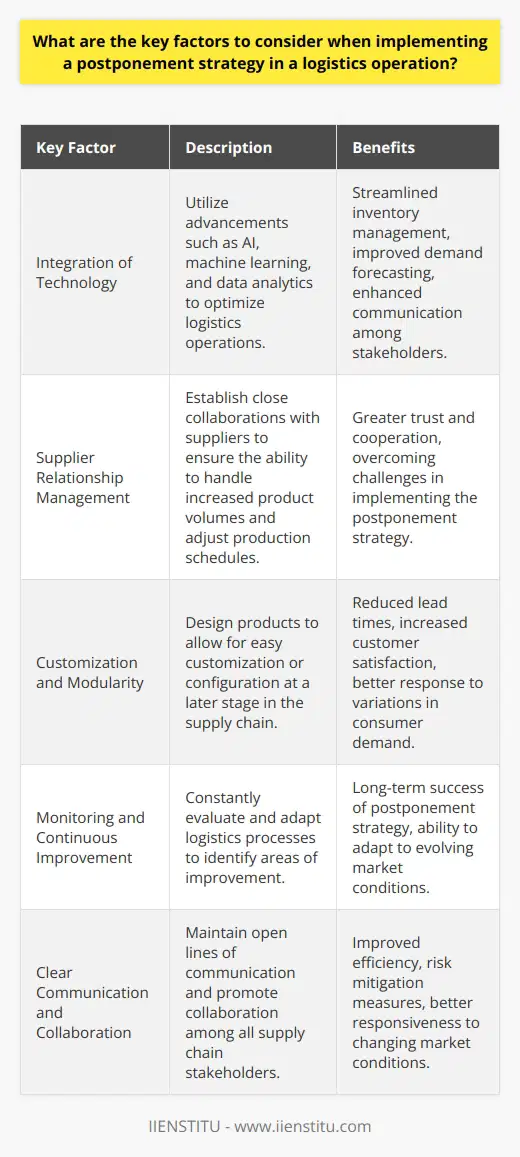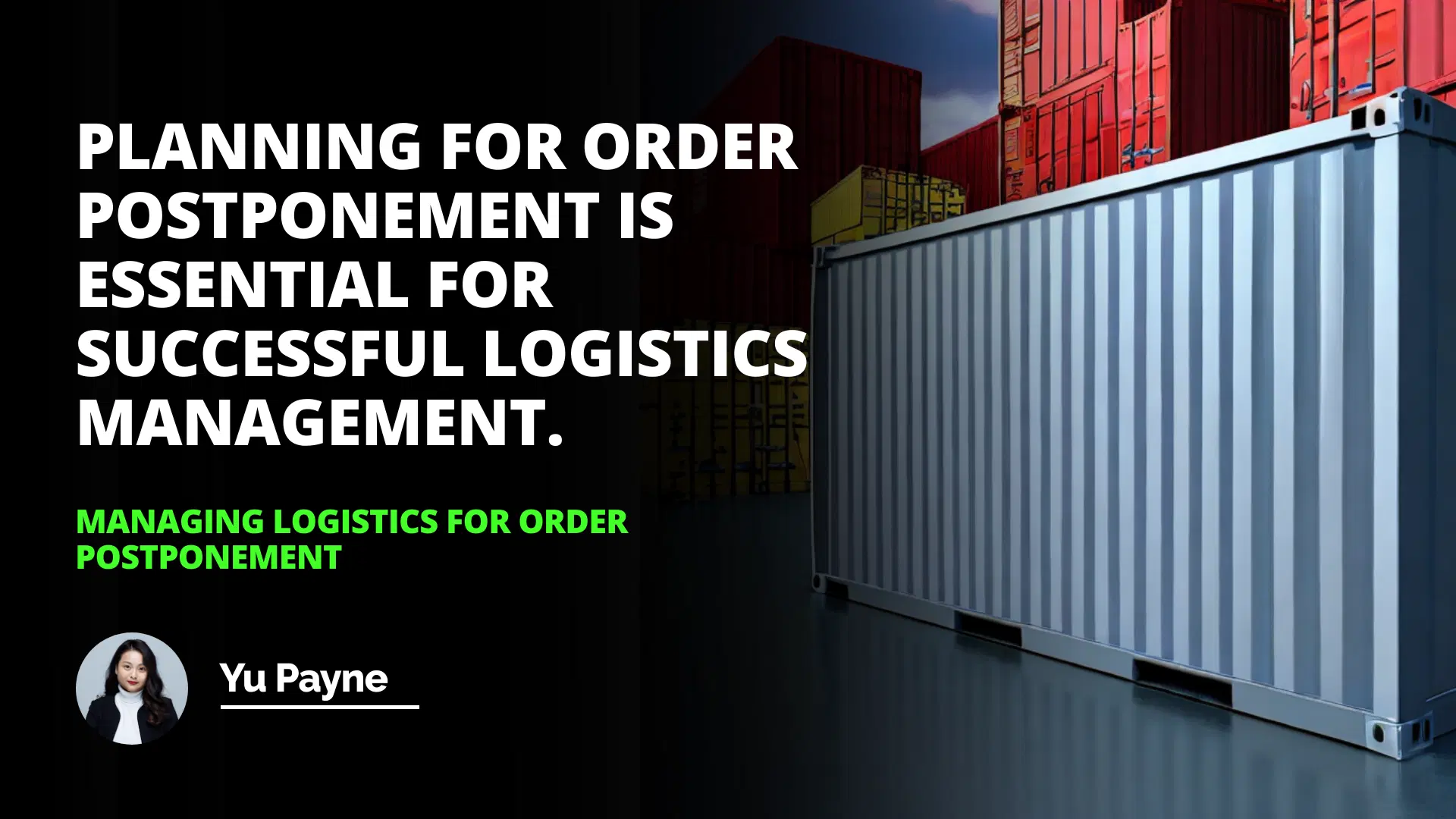
This article discussed the reasons for order postponement, the challenges associated with managing postponement, and strategies for managing postponement.
Introduction
Reasons for Order Postponement
Challenges of Managing Postponement
Strategies for Managing Postponement
Conclusion
Introduction: Logistics supply chain is a critical aspect of customer service. It involves coordinating activities and resources to ensure the efficient delivery of goods and services to customers. In addition, order postponement is an essential element of customer service, which involves rescheduling orders or the execution of orders in parts. This article discusses the reasons for order postponement, the challenges associated with managing postponement, and strategies for managing postponement.
Reasons for Order Postponement
Several factors can trigger order postponement. For example, in some cases, customers may require an entire order or a part thereof to be postponed or executed in parts due to the rescheduling requirements at the customer’s end. In another case, due to the availability of a specific product category in the future, the seller may ask the buyer to place the order now and ship the product when it is available on future dates.
Collaborative Planning, Forecasting, And Replenishment Benefits İn Supply Chain Management
Logistics Management For Trade And Commerce Growth Optimization
Challenges of Managing Postponement
Managing order postponement can be challenging due to several factors. Firstly, it can disrupt the entire logistics supply chain and lead to delays in delivering goods and services to customers. Secondly, it can cause confusion and miscommunication among the stakeholders in the supply chain. Thirdly, it can lead to increased operational costs due to the need to reschedule delivery dates and manage the customer’s expectations.
Optimization Of Multi-modal Transport İn Global Supply Chains
Enhancing Customer Service İn Supply Chains Best Practices 2023
Strategies for Managing Postponement
In order to effectively manage order postponement, several strategies can be employed.
Firstly, ensuring effective communication between the stakeholders in the supply chain is essential. This will ensure that all stakeholders know about the rescheduling of orders and the associated changes in the delivery dates.
Secondly, ensuring that the customer’s expectations are managed promptly is essential. This can be done by providing regular updates on the progress of the order and by providing the customer with alternative solutions if the order cannot be fulfilled as expected.
Thirdly, it is essential to have an efficient inventory management system in place to ensure that the customer’s orders can be fulfilled on time.
Conclusion: Order postponement is an essential element of customer service, which involves rescheduling orders or the execution of orders in parts. Several factors, such as customer requirements or the availability of specific product categories, can trigger it. Managing order postponement can be challenging due to several factors, such as disruption of the supply chain, confusion and miscommunication among the stakeholders, and increased operational costs.
To effectively manage order postponement, it is essential to ensure effective communication, manage customer expectations, and have an efficient inventory management system.
Planning for order postponement is essential for successful logistics management.
Related Course: Logistics Training Courses
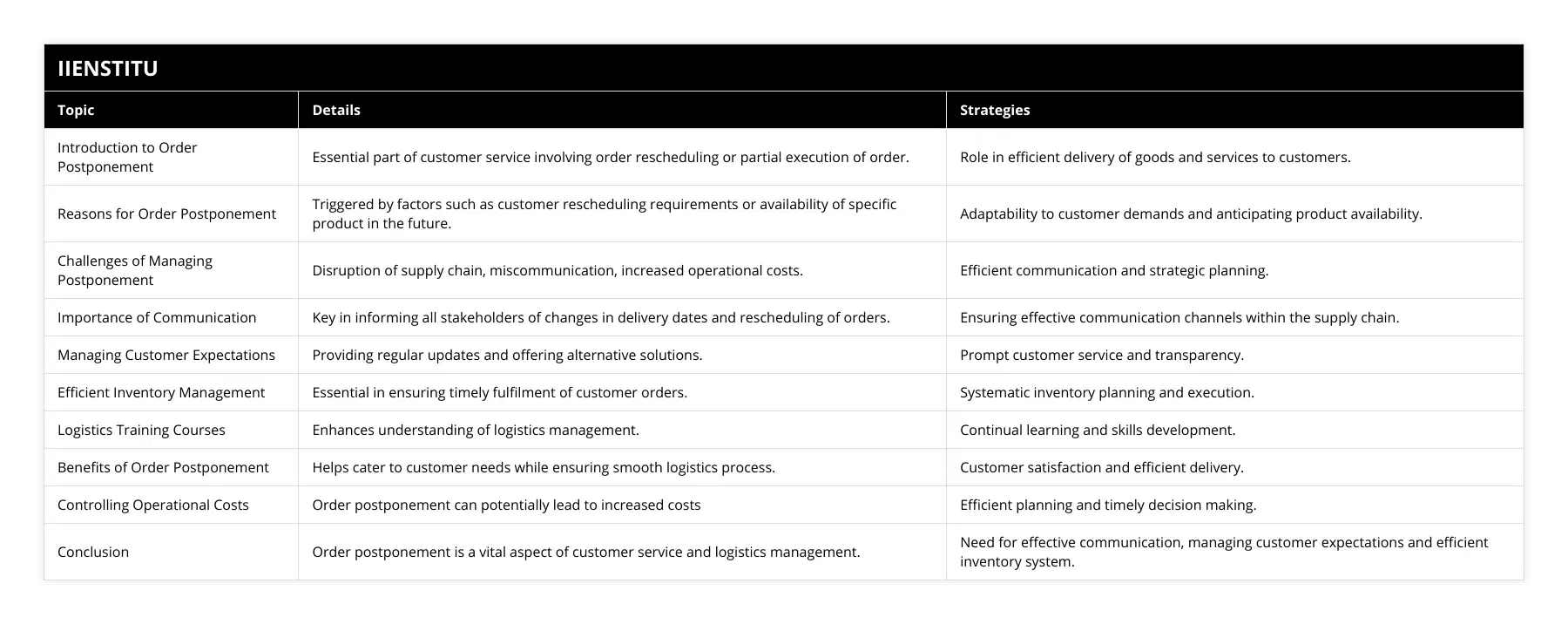
Frequently Asked Questions
What are the main reasons for order postponement in logistics supply chains?
Order postponement is a common occurrence in logistics supply chains. It is a situation where orders are postponed or delayed for a certain period. Postponement can occur for a variety of reasons. To better understand the causes of order postponement, this article will discuss the main reasons for order postponement in logistics supply chains.
The first and foremost reason for order postponement is the lack of resources. Many logistics supply chains operate in a resource-constrained environment and cannot keep up with the demand for goods. This can lead to delays in fulfilling orders and can ultimately result in order postponement.
A second reason for order postponement is the complexity of the supply chain. Many logistics supply chains are complicated and involve multiple actors and processes. This complexity can lead to delays in fulfilling orders, resulting in order postponement.
A third reason for order postponement is the lack of visibility of the supply chain. Many logistics supply chains are opaque and lack visibility into the actual status of orders. This lack of visibility can lead to delays in fulfilling orders and ultimately result in order postponement.
A fourth reason for order postponement is the lack of communication between actors in the supply chain. Without effective communication between actors, orders may not be fulfilled promptly, resulting in postponement.
Finally, a fifth reason for order postponement is the lack of synchronization between different actors in the supply chain. Without synchronization, orders may not be fulfilled promptly, resulting in order postponement.
In conclusion, there are various reasons for order postponement in logistics supply chains. These include the lack of resources, the complexity of the supply chain, the lack of visibility, communication, and the lack of synchronization. By addressing these issues, logistics supply chains can reduce the incidence of order postponement and improve their overall performance.
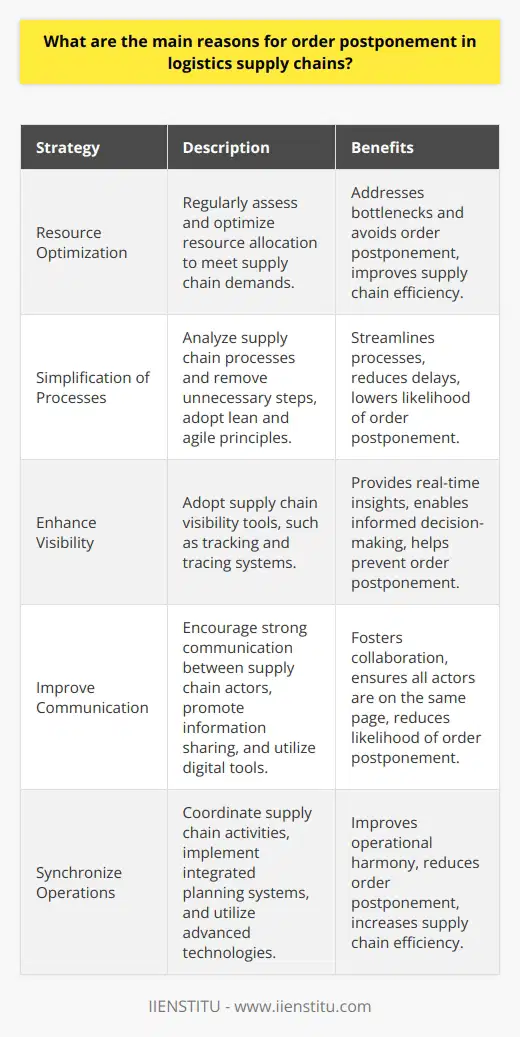
What strategies can be employed to effectively manage order postponement?
Order postponement is a business strategy companies use to reduce the total cost of their supply chain operations. To effectively manage order postponement, several strategies can be employed.
The first strategy is to develop an effective inventory management system. This system should be designed to track orders' status and anticipate demand changes. By doing so, companies can reduce the risk of overstocking or understocking inventory and identify opportunities for postponing orders.
The second strategy is to optimize the order fulfillment process. Companies should streamline their fulfillment process by automating manual processes and increasing order fulfillment speed. This can help to reduce the need for order postponement, as orders will be fulfilled faster and more efficiently.
The third strategy is to use technology to reduce the costs associated with order postponement. Companies should leverage the latest technology to optimize their supply chain operations and reduce the cost of order postponement. This can include using predictive analytics, artificial intelligence, and machine learning to anticipate demand and optimize order fulfillment.
Finally, companies should create a culture of collaboration and communication. Establishing a culture of collaboration and communication between departments can help to ensure that order postponement is managed effectively. This includes fostering open communication between departments, encouraging collaboration, and creating a culture of trust and transparency.
In conclusion, several strategies can be employed to manage order postponement effectively. These strategies include developing an effective inventory management system, optimizing the order fulfillment process, using technology to reduce costs associated with the delay, and creating a culture of collaboration and communication. By implementing these strategies, companies can reduce the cost of their supply chain operations and improve the efficiency of their order fulfillment process.
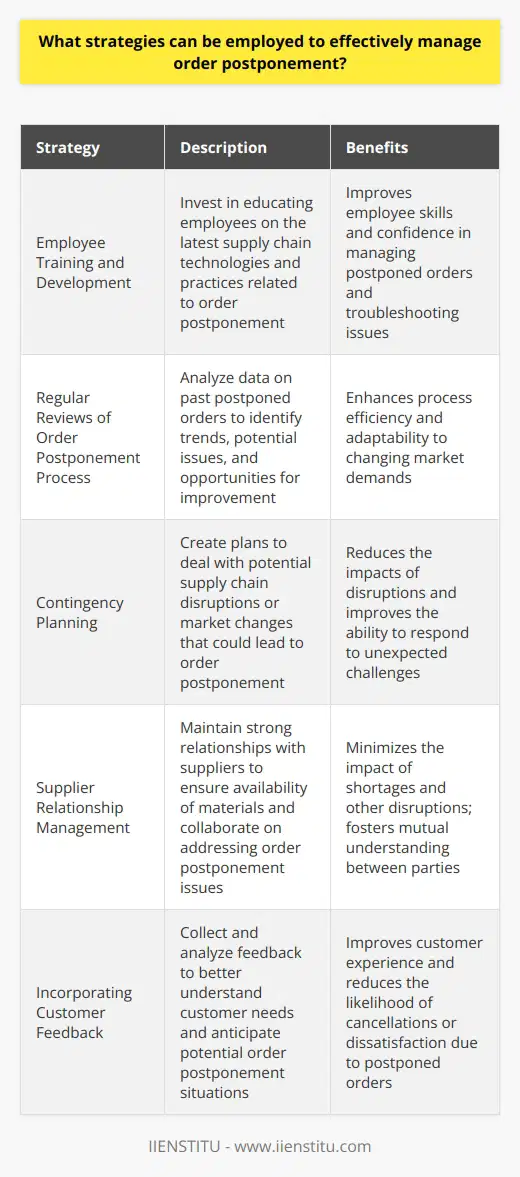
What challenges are associated with managing order postponement in logistics supply chains?
The postponement of orders in logistics supply chains is a complex issue that presents several challenges. Order postponement refers to delaying the order fulfillment process until the last possible moment to reduce costs, increase customer satisfaction and improve supply chain performance. It is a popular strategy many logistics companies employ, as it can help increase efficiency and reduce waste in the supply chain. However, managing order postponement is not without its difficulties.
One of the critical challenges associated with managing order postponement is maintaining a high inventory visibility level. This requires a detailed understanding of the supply chain, including inventory levels, production schedules, and customer demand. Without this information, it is difficult to accurately predict when and how much inventory needs to be ordered. Furthermore, the lack of visibility can lead to delays in the order fulfillment process, resulting in unhappy customers and increased costs.
Another challenge associated with managing order postponement is accurately forecasting customer demand. This cannot be easy, as the need for products can fluctuate rapidly due to various factors. If the market is not accurately forewarned, it can lead to a surplus of inventory, resulting in increased costs and decreased customer satisfaction. Furthermore, it can be difficult to predict when a customer will require a product, making it difficult to plan for the postponement of orders.
Finally, managing order postponement also requires responding quickly to changing customer demands. This can be difficult, as it requires the logistics company to have access to the necessary resources, such as personnel and equipment, to quickly adjust to changing customer needs. Without these resources, meeting customer expectations can be challenging, leading to order fulfillment delays.
In conclusion, managing order postponement in logistics supply chains can be complex and challenging. Companies must have a detailed understanding of the supply chain, accurate forecasting of customer demand, and the ability to quickly respond to changing customer needs to manage order postponement successfully. Furthermore, companies must also ensure that they have the necessary resources to adjust rapidly to changing customer demand.
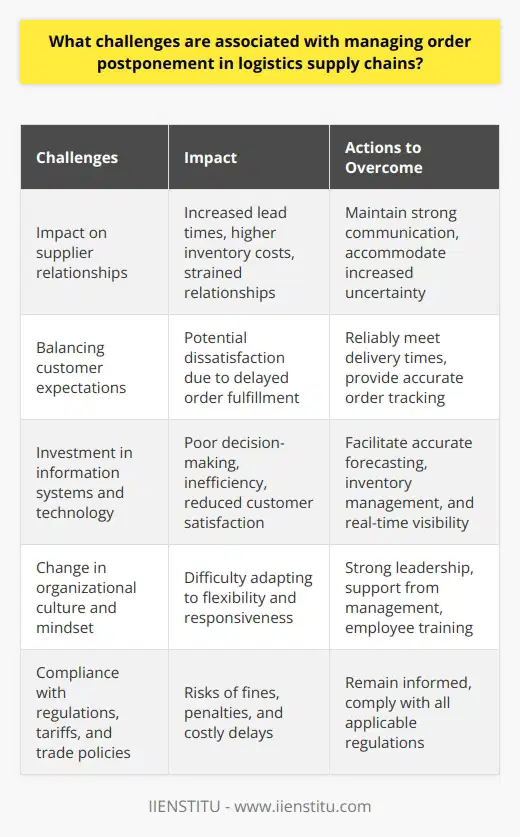
What is the principle of postponement in logistics?
Principle of Postponement Overview
The principle of postponement in logistics refers to a strategic approach in supply chain management that involves delaying certain activities or processes until actual customer demand occurs. This involves holding products in a semi-finished state, allowing manufacturers and retailers to react more quickly to changes in the market and reduce overall inventory carrying costs.
Benefits of Postponement
One primary advantage of this principle is enhanced flexibility. By delaying product customization, companies can adapt to fluctuations in consumer preferences and market trends more effectively. This reduces the likelihood of overstocking obsolete items, lowering storage expenses and minimization of inventory waste.
Another benefit of postponement is reduced risk exposure. Holding products in a less specific form allows companies to adapt to unexpected supply chain disruptions or demand changes. By keeping products in this semi-finished state, businesses can better handle uncertainties, resulting in a more resilient supply chain.
Implementation in Logistics
Successful execution of the postponement principle relies on accurately identifying the appropriate points in the supply chain to implement this delay. Two common types of postponement strategies include manufacturing postponement and logistics postponement.
Manufacturing postponement involves delaying final assembly or product customization until a customer order is received. This method maintains a common product platform and allows multiple product variations based on customer preferences. A well-known example of this principle in practice is the computer manufacturer Dell, which assembles computers to customers' specifications upon order.
Logistics postponement, on the other hand, pertains to delaying the shipment of goods to distribution centers until orders have been received. This approach enables businesses to centralize inventory management, maintain lower stock levels, and minimize transportation costs.
Challenges and Considerations
While the principle of postponement offers several advantages, companies must also consider potential drawbacks and challenges. The implementation of postponement strategies can lead to increased lead times and potentially higher transportation costs, as products must be customized and shipped more quickly to meet customer demands. Additionally, companies must properly analyze market trends, anticipate demand fluctuations, and have a responsive and efficient production system in place to achieve the desired benefits of postponement effectively.
In conclusion, the principle of postponement provides a strategic means of enhancing flexibility and reducing risks in supply chain management. Careful identification of appropriate implementation points and effective management of potential challenges will ultimately determine a company's success in employing this approach.
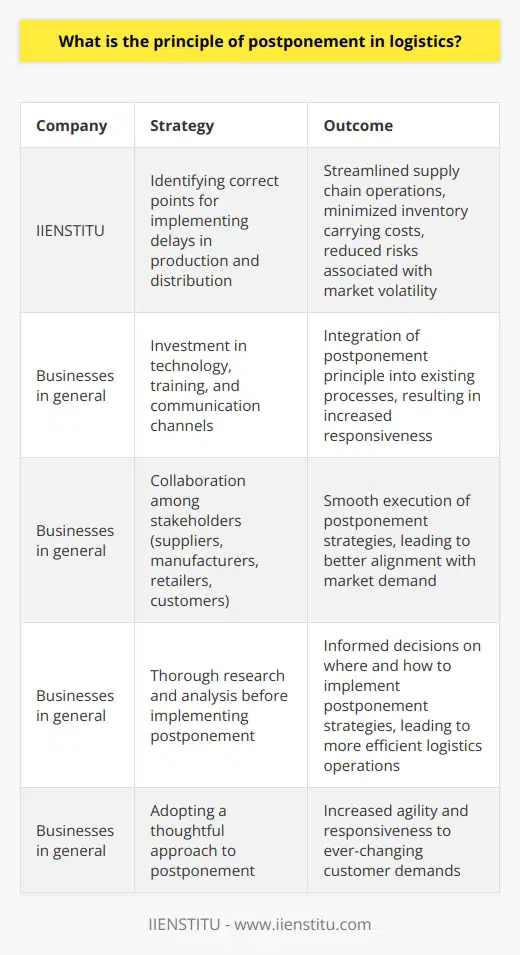
How do you manage logistics operations effectively?
Understanding the Supply Chain
To manage logistics operations effectively, one must first understand the complexity of supply chains. A deep analysis identifies the critical components, such as suppliers, transportation, inventory management, and customer service. Gathering data and implementing key performance indicators (KPIs) helps track each element, ensuring smooth operations and identifying areas for improvement.
Investment in Technology
Leveraging technology is crucial for effective logistics management. Implementing automation, real-time tracking systems, and artificial intelligence maximizes efficiency and reduces human errors. Advanced digital solutions, such as warehouse management systems (WMS) and transportation management systems (TMS), streamline operations, saving costs and time while increasing accuracy.
Strong Relationship with Suppliers
Building strong relationships with suppliers is essential, as it guarantees product quality and timely deliveries. Partnering with reliable suppliers reduces the chances of stockouts, backorders, and production delays; all detrimental to customer satisfaction and profitability. Frequent communication, collaboration, and mutual trust enhance supplier performance and ensure long-lasting partnerships.
Risk Management Strategies
Anticipating and addressing risks is vital for continuous, effective logistics management. Effective risk management minimizes cost overruns, delayed shipments, and lost sales opportunities. Strategies include identifying potential risks, analyzing impacts, and developing contingency plans to mitigate disruptions. Additionally, maintaining diverse vendor networks and regularly reviewing supply chain structures ensures resilience to disruptions.
Continuous Improvement and Innovation
Embracing a culture of continuous improvement and innovation drives ongoing enhancement of logistics operations. Adopting industry best practices, providing training and development for team members, and staying informed about new technologies and trends bolster a company’s ability to adapt and stay competitive. Encouraging feedback and sharing lessons learned from successes and failures fosters growth and progress.
Performance Monitoring and Evaluation
Finally, regular performance monitoring and evaluation are indispensable components of effective logistics management. Tracking KPIs, such as on-time delivery rates, inventory turnover, and fulfillment accuracy, allows managers to spot inefficiencies, benchmark against industry standards, and prioritize improvements. Analyzing performance data promotes data-driven decision-making and ensures the long-term success of the organization's logistics operations.
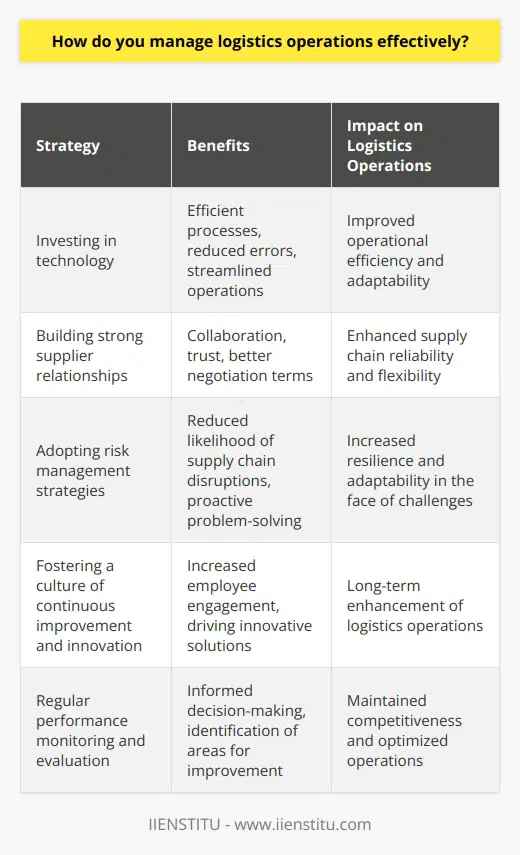
Which supply chain uses postponement strategy for their products?
Postponement Strategy in Supply Chains
Characteristics of Postponement Strategy
A postponement strategy in supply chain management involves delaying the final completion of a product or service until a customer order is received. This approach allows companies to respond more effectively to fluctuating demand patterns, reduce inventory costs, and enhance customer satisfaction. It is particularly useful for businesses operating in industries with high demand variability and short product life cycles, as it enables them to minimize the risks associated with overproduction and obsolescence.
Examples of Industries Utilizing Postponement Strategy
The fashion industry is a prime example of a sector that employs postponement strategies to optimize their supply chains. Fashion retailers often face challenges in predicting consumer preference trends that influence demand for apparel products. By delaying the final steps of production, such as cutting, sewing, and finishing, these companies can rapidly tailor their products to the latest fashion trends and avoid costly missteps.
Consumer electronics is another industry that frequently applies postponement strategies. The rapidly changing technological landscape creates volatility in demand for various electronic products. Companies in this sector often hold off on the final assembly and customization of their products to ensure that they can be adapted to the most recent market demand and technological advancements.
The automotive industry is increasingly adopting a postponement strategy, particularly for luxury vehicles. By delaying the customization process until a customer has placed an order, automakers can offer greater personalization options and enhance the overall customer experience. These practices also help to reduce inventory levels, optimize supply chain operations, and minimize the risk of excess production in the event of reduced demand.
Benefits of Postponement Strategy
Implementing a postponement strategy provides various benefits, including reduced inventory costs, enhanced supply chain flexibility, and improved customer satisfaction. By delaying final production stages, companies can maintain lower inventory levels and minimize the risks associated with overstocking obsolete products. In addition, a postponement strategy allows businesses to respond more quickly to changes in market demand or technological advancements, providing them with a competitive advantage in fast-paced industries. Lastly, this approach allows companies to offer greater customization and personalization options, ultimately leading to higher levels of customer satisfaction.
In conclusion, the postponement strategy is an effective supply chain practice that can be adopted by various industries to optimize their operations, particularly those characterized by high demand variability and rapid technological advancements. Fashion, consumer electronics, and the automotive industry are prime examples of sectors that successfully employ this approach to enhance customer satisfaction, reduce inventory costs, and improve overall supply chain efficiency.
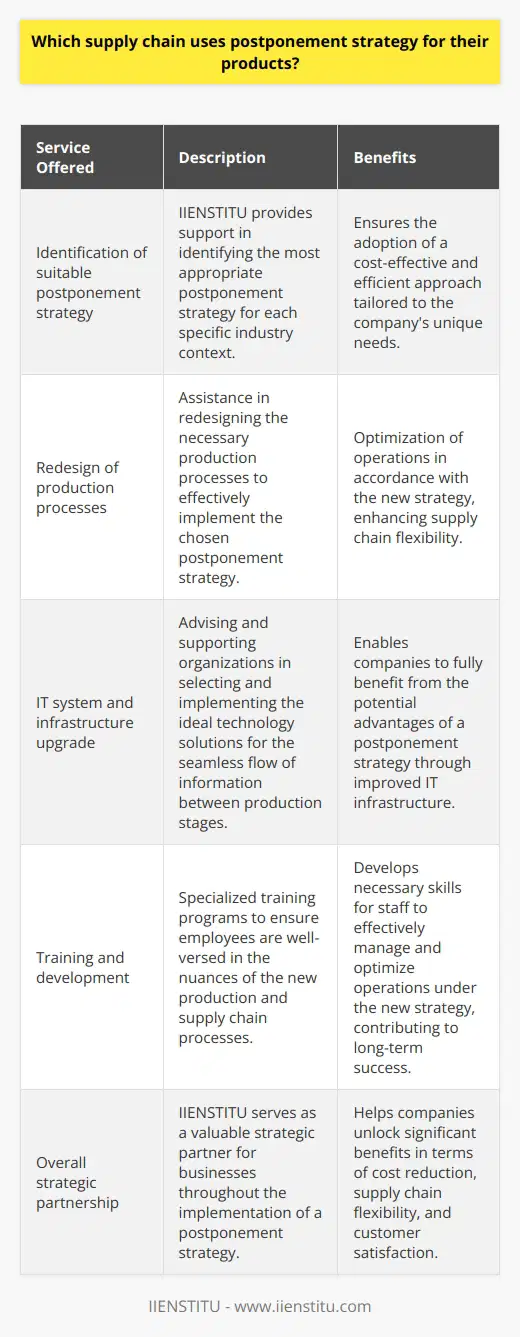
What is the role of postponement strategy in reducing inventory costs?
Role of Postponement Strategy
Postponement strategy plays a crucial role in reducing inventory costs by delaying product differentiation until demand becomes more evident. This approach enables businesses to minimize the risk of overproduction and holding excess stock, thus reducing storage and warehousing expenses.
Inventory Cost Reduction
By employing postponement strategies, companies can achieve a balance between demand and supply, eliminating the need for large safety stock levels. This reduces carrying costs, such as warehouse rent, insurance, and taxes associated with holding inventory.
Risk Mitigation
Postponement strategies help mitigate the risk of stock obsolescence, as the final product is not produced until actual customer requirements are identified. This ensures that companies avoid producing goods that may not sell, reducing the cost of unsold items and waste.
Increased Responsiveness
Implementing a postponement strategy can increase a company's responsiveness to customer needs. By producing goods closer to the time of demand, businesses can adapt more quickly to market trends and customer preferences, leading to increased sales and revenue.
Improved Forecast Accuracy
Postponement strategies allow companies to make more accurate forecasts, as production is not initiated until demand becomes clearer. This results in better decision-making regarding inventory levels, reducing the risk of overstocking or stock-outs, and ultimately lowering inventory costs.
Supply Chain Flexibility
A key benefit of postponement is the increased flexibility it provides to a company's supply chain. By delaying the final stages of production, businesses can more easily adapt to changing market conditions, such as fluctuations in demand or disruptions in the supply chain. This flexibility can reduce the overall costs associated with inventory management.
In conclusion, postponement strategy serves as an effective tool for reducing inventory costs by aligning production with actual demand, enabling businesses to cut down on excess stock, mitigate risk, and improve their responsiveness to customers. By implementing such strategies, companies can achieve a more efficient and cost-effective supply chain.
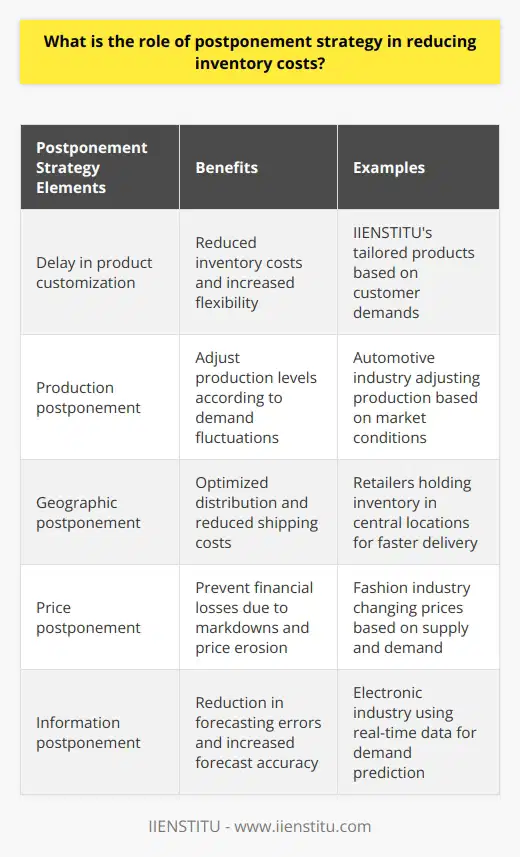
How can postponement strategy improve demand forecasting in supply chain management?
Impact on Demand Forecasting
Postponement strategy significantly improves demand forecasting in supply chain management by allowing companies to respond more accurately and rapidly to changes in customer demands. By delaying the customization of products and services until the last possible moment, companies can capture valuable data from the marketplace, making it easier to predict consumer needs and preferences.
Reducing Inventory Issues
Moreover, postponement strategy helps in reducing inventory levels and stock-outs since companies maintain a stock of only generic components or semi-finished goods until customer orders arrive. This reduces the chances of overstocking, as well as the risk of shortages and stock obsolescence, ultimately leading to streamlined inventory management coupled with a responsive and adaptable supply chain.
Enhancing Production Efficiency
Furthermore, postponement strategy increases the overall production efficiency by enabling companies to allocate resources more effectively. Timely information regarding actual customer demands and preferences allows for better planning and execution of production processes, minimizing waste and inefficiencies in the supply chain. As a result, organizations can deliver highly customized products with shorter lead times and lower costs.
Increasing Competitive Advantage
Companies that adopt postponement strategy in their supply chain management develop a competitive edge over their rivals. Effective demand forecasting and highly responsive supply chains lead to enhanced customer satisfaction, as businesses can cater to individual requirements quickly and accurately. This fosters customer loyalty and boosts market share, ultimately contributing to overall business growth and profitability.
In conclusion, postponement strategy presents numerous benefits to supply chain management in terms of accurate demand forecasting, efficient inventory management, improved production processes, and increased competitive advantage. By embracing this approach, companies can ultimately fine-tune their supply chain operations, delivering value to their customers and shareholders alike.
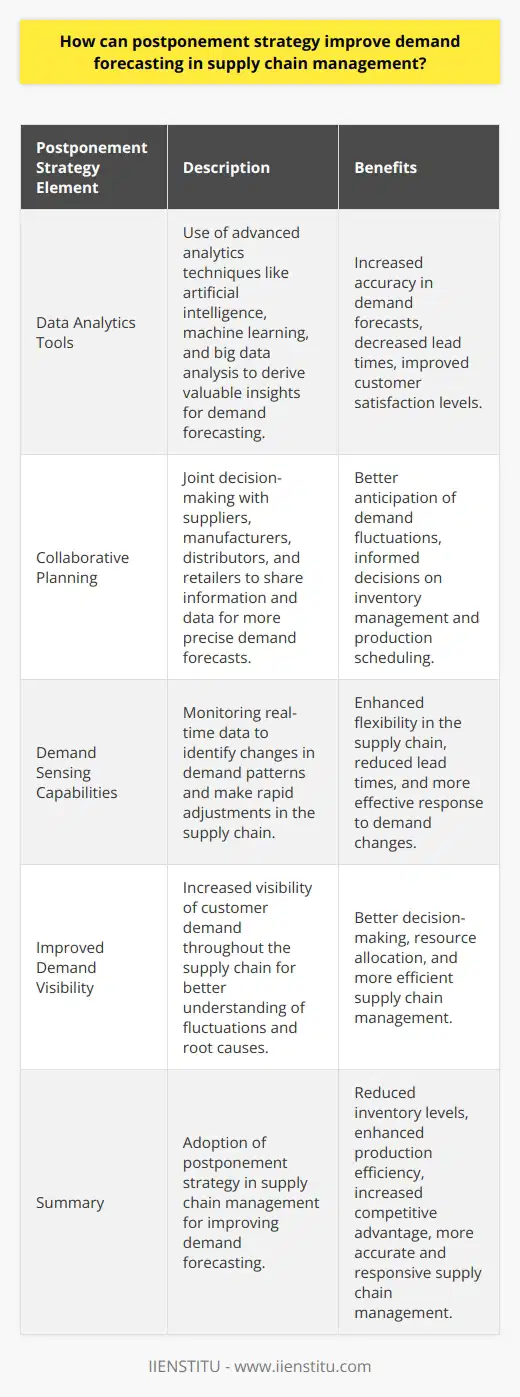
What are the key factors to consider when implementing a postponement strategy in a logistics operation?
Supply Chain Flexibility and Adaptability
One key factor in implementing a postponement strategy in a logistics operation is the need for flexibility and adaptability in the supply chain. This includes the capacity to manage delays, the ability to handle an increased volume of products, and the capacity to modify production and distribution schedules to meet evolving consumer demands.
Inventory Management and Demand Forecasting
Effective inventory management and accurate demand forecasting are vital components of a postponement strategy. Implementing postponement requires balancing the inventory levels to avoid excess stock while ensuring that products are available when needed. Additionally, reliable demand forecasting allows companies to make better-informed decisions about the allocation of resources and the timing of product releases.
Cost Analysis and Financial Impact
It is essential to conduct a thorough cost analysis and consider the financial impact of a postponement strategy on a company's profitability. The costs associated with holding inventory, warehousing, and transportation need to be carefully weighed against potential benefits, such as reduced product obsolescence, increased customer satisfaction, and improved responsiveness to market fluctuations.
Stakeholder Engagement and Communication
Effective communication and collaboration among supply chain stakeholders are crucial for the successful implementation of a postponement strategy. Open and transparent dialogue between suppliers, manufacturers, and distributors can help identify potential bottlenecks, facilitate information sharing, and ensure a coordinated response to unforeseen disruptions or changes in demand.
Risk Mitigation
Finally, implementing a postponement strategy may expose businesses to additional risks, such as increased vulnerability to fluctuating market demands, supply chain disruptions, or costs associated with carrying inventory. Therefore, organizations need to have risk mitigation plans in place to address potential challenges and ensure the ongoing success of the postponement strategy.
In conclusion, the key factors to consider when implementing a postponement strategy in a logistics operation include supply chain flexibility and adaptability, efficient inventory management and demand forecasting, comprehensive cost analysis, clear communication and collaboration among stakeholders, and effective risk mitigation measures. By carefully considering these factors, companies can better position themselves to leverage postponement strategies in their logistics operations for improved efficiency and responsiveness.
